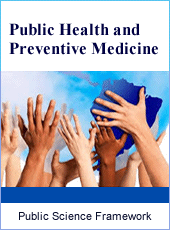Public Health and Preventive Medicine
Articles Information
Public Health and Preventive Medicine, Vol.1, No.1, Apr. 2015, Pub. Date: Mar. 26, 2015
Examining Culture and Lifestyle in Public Health
Pages: 17-23 Views: 6444 Downloads: 1052
[01]
Samuel O. Chukwu-Okoronkwo, Department of Mass Communication, Abia State University, Uturu, Nigeria.
[02]
Nnenna E. Okoronkwo, Department of Pure and Industrial Chemistry, Abia State University, Uturu, Nigeria.
Fundamental to the implication and understanding of the concept of culture and lifestyle in relation to public health is the fact that the context in which people live is of great importance for their health status and quality of life. Public health emphasizes the science and art of disease prevention, prolonging of life as well as promoting the health and well-being of the people. It targets to ensure conditions that promote the health and well-being of the people. However, the realization of the above objectives which is directed at the maintenance and improvement of health standard of the people is not only a function of the advancement and application of health science but as well a function of the people’s conscientious and determined efforts to maintain positive health practices and lifestyle. Construed from the foregoing perspective, it is easy to realize the fact that the concept of culture and lifestyle with regards to public health has sociological implication. Hence, though there are other variables that can also determine the health condition of a people, or even an individual, the focus of this chapter will centre on the sociological milieu or context. It is this sociological platform which actually defines people’s relationship within the structure, that also conditions their predisposition to healthy conditions of life or otherwise. From this sociological focal lens, emphasis will be on gender issues with regards to aspects of gender-based practices that exist as product of cultural construct as well as peer group influence as also generating from the lifestyle people choose to live, to critically examine the extent to which these determine or condition people’s health status and quality of life.
Cultural Construct, Gender Issue, Health Practices, Lifestyle, Peer Group Influence, Public Health
[01]
Tylor, E. B. (1974). [1871] Primitive Culture: Researches into the Development of Mythology, Philosophy, Religion, Art, and Custom. New York: Gordon Press.
[02]
UNESCO (2002). Universal Declaration on Cultural Diversity, issued on International Mother Language Day, February 21.
[03]
Contoyannis, P. and Jones, A. M. (2004). “Socio-economic status, health and lifestyle”. Journal of Health Economics 23: 965–995.
[04]
Korieh, C. J. “Widowhood among the Igbo of Eastern Nigeria”, M.Phil. Dissertation, University of Bergen, Norway, 1996.
[05]
Okoye, P. U. (1995). Widowhood: A National or Cultural Tragedy. Enugu: Nok Publishers.
[06]
Okoye, J. N. (1998). “Customary Practices against Widows in Nigeria: The Igbo experience”, paper presented at a two-day seminar organized by the Ministry of Women Affairs and Social Development, Awka, Anambra State.
[07]
Labeodan, H. A. (2002). “Beyond Critique: A Philosophical Appraisal of some Cultural Practices Infringing on the Rights of Women in Yorubaland”, in Docas Akintunde & Helen L. (eds.) Women and the Culture of Violence in Traditional Africa. Ibadan: Sefer Books Ltd: 68 - 78.
[08]
Obermeyer, C. M. (2005). “The Consequences of Female Circumcision for Health and Sexuality: An Update on the Evidence”. In Culture, Health & Sexuality, Vol. 7, No. 5, (Sep. - Oct.): 443 – 461.
[09]
Health Canada (2009). “Health Effects of Smoking”. Accessed from http://www.hc-sc.gc.ca/hc-ps/tobac-tabac/quit-cesser/now-maintenant/road-voie/_program/unit2-8-eng.php
[10]
Health Check Systems (2012). Accessed from http://www.healthchecksystems.com/alcohol.htm

ISSN Print: 2381-778X
ISSN Online: 2381-7798
Current Issue:
Vol. 7, Issue 3, September Submit a Manuscript Join Editorial Board Join Reviewer Team
ISSN Online: 2381-7798
Current Issue:
Vol. 7, Issue 3, September Submit a Manuscript Join Editorial Board Join Reviewer Team
| About This Journal |
| All Issues |
| Open Access |
| Indexing |
| Payment Information |
| Author Guidelines |
| Review Process |
| Publication Ethics |
| Editorial Board |
| Peer Reviewers |


